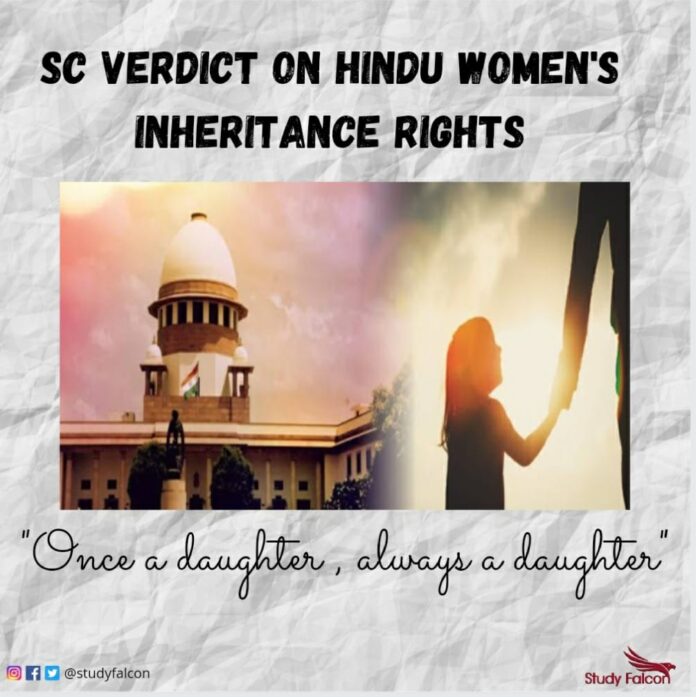A three-judge Bench headed by Justice Arun Mishra ruled that a Hindu woman’s right to be a joint heir to the ancestral property is by birth and does not depend on whether her father was alive or not when the law was enacted in 2005. This landmark judgemnt came in on 11th August on behalf of Vineeta sharma VS Rakesh sharma . The judgment pertains to the Hindu Succession Amendment Act, 2005. “Since the coparcenary is by birth, it is not necessary that the father coparcener should be living as on 9.9.2005,” the ruling said. Justice Arun Mishra said, “Daughters must be given equal rights as sons. Daughter remains a loving daughter throughout life. ”

Hindu Succession Act, 1956
The Mitakshara school of Hindu law codified as the Hindu Succession Act, 1956 governed succession and inheritance of property but only recognised males as legal heirs.It applied to everyone who is not a Muslim, Christian, Parsi or Jew by religion. Buddhists, Sikhs, Jains and followers of Arya Samaj, Brahmo Samaj, are also considered Hindus for this law.In a Hindu Undivided Family, several legal heirs through generations can exist jointly. Traditionally, only male descendants of a common ancestor along with their mothers, wives and unmarried daughters are considered a joint Hindu family. The legal heirs hold the family property jointly.
Hindu Succession (Amendment) Act, 2005
The 1956 Act was amended in September 2005 and women were recognised as coparceners for property partitions arising from 2005.
Section 6 of the Act was amended to make a daughter of a coparcener also a coparcener by birth “in her own right in the same manner as the son”.It also gave the daughter the same rights and liabilities “in the coparcenary property as she would have had if she had been a son”.The law applies to ancestral property and to intestate succession in personal property, where succession happens as per law and not through a will.The 174th Law Commission Report had recommended the reform in Hindu succession law.Before the 2005 amendment, Andhra Pradesh, Karnataka, Maharashtra and Tamil Nadu had made this change in the law and Kerala had abolished the Hindu Joint Family System in 1975.

Issues concerning previous judgments
The 2005 law granted equal rights to women, questions were raised in multiple cases on whether the law applied retrospectively, and if the rights of women depended on the living status of the father through whom they would inherit. In 2015, a two-judge Bench headed by Justice A K Goel held that the benefit of the 2005 amendment could be granted only to “living daughters of living coparceners”. In February 2018, contrary to the 2015 ruling, a two-judge Bench headed by Justice A K Sikri held that the share of a father who died in 2001 will also pass to his daughters as coparceners during the partition of the property as per the 2005 law. Then in April that year, yet another two-judge bench, headed by Justice R K Agrawal, reiterated the position taken in 2015. These conflicting views by Benches of equal strength led to a reference to a three-judge Bench in the current case.

Aftermath
The court looked into the rights under the Mitakshara coparcenary. Since Section 6 creates an “unobstructed heritage” or a right created by birth for the daughter of the coparcener, the right cannot be limited by whether the coparcener is alive or dead when the right is operationalised. The court also directed High Courts to dispose of cases involving this issue within six months since they would have been pending for years. Solicitor General Tushar Mehta argued in favour of an expansive reading of the law to allow equal rights for women. He referred to the objects and reasons of the 2005 amendment. “The Mitakshara coparcenary law not only contributed to discrimination on the ground of gender but was oppressive and negated the fundamental right of equality guaranteed by the Constitution of India,” he submitted.










